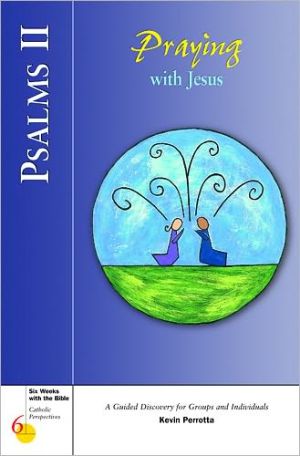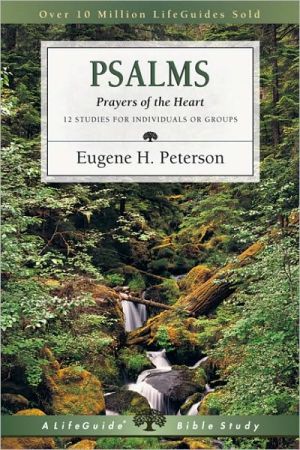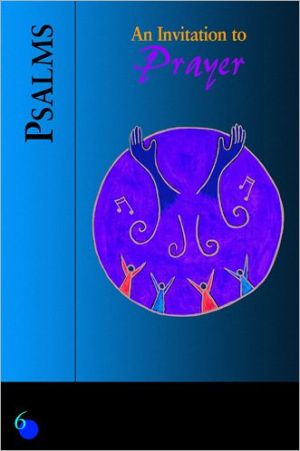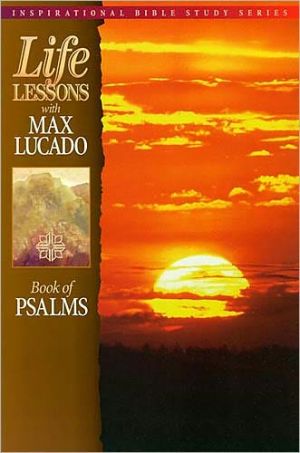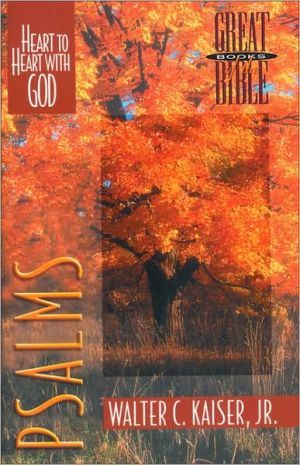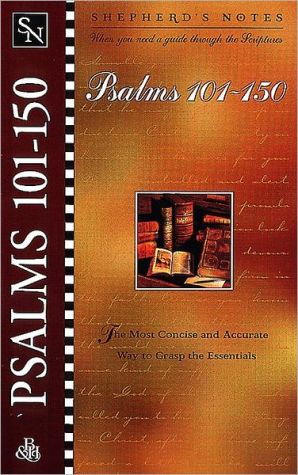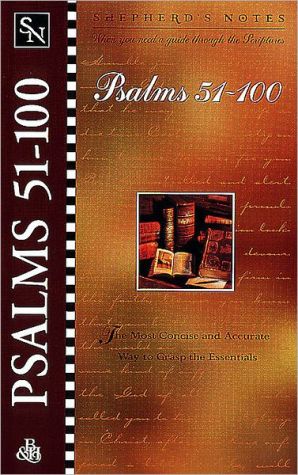Six Weeks with the Bible: Psalms II: Praying with Jesus
Praying the Psalms takes on new meaning when we pray the psalms that Jesus himself prayed. Psalms II: Praying with Jesus takes a look at six psalms that played an important role in Jesus' life and helps readers apply those words to their lives and prayers today.\ A Guided Discovery of the Bible The Bible invites us to explore God’s word and reflect on how we might respond to it. To do this, we need guidance and the right tools for discovery. The Six Weeks with the Bible series of Bible...
Search in google:
The award-winning Six Weeks with the Bible series guides individuals and groups through the meaning of Scripture and its application to everyday life. For busy adults who want to study the Bible but don't know where to begin, this series provides an inviting starting point. Each guide is divided into six concise, 90-minute segments. This volume is the second of two titles in the series that explore the Book of Psalms. All biblical text is printed in the guide, which means no additional study aids are required.
Psalms II\ Praying with Jesus \ \ By Kevin Perrotta \ Loyola Press\ Copyright © 2003 Kevin Perrotta\ All right reserved.\ ISBN: 9780829415704 \ \ \ How to Use This Guide\ You might compare the Bible to a national park. The park is so large that you could spend months, even years, getting to know it. But a brief visit, if carefully planned, can be enjoyable and worthwhile. In a few hours you can drive through the park and pull over at a handful of sites. At each stop you can get out of the car, take a short trail through the woods, listen to the wind blowing through the trees, get a feel for the place.\ In this booklet we will read six of the psalms that played a prominent role in Jesus’ life, along with the Gospel passages in which the psalms are quoted. We will take a leisurely walk through each of the psalms and Gospel excerpts, thinking carefully about what we are reading and what it means for our lives today. Although the Scripture readings are short, they will give us a great deal to reflect on. The psalms teach us about prayer and about God’s saving plan for us, and the Gospel passages focus on Jesus in a way that illuminates who he is and what he has done for us.\ This guide provides everything you need to explore these biblical readings in six discussions—or to do a six-part exploration on your own. The introduction on page 6 will prepare you to get the most out of your reading. The weekly sections provide explanations that highlight what the psalms mean for us today. Equally important, each section supplies questions that will launch your group into fruitful discussion, helping you to both investigate the readings for yourself and learn from one another. If you’re using the booklet by yourself, the questions will spur your personal reflection.\ Each discussion is meant to be a guided discovery.\ Guided. None of us is equipped to read the Bible without help. We read the Bible for ourselves but not by ourselves. Scripture was written to be understood and applied in the community of faith. So each week “A Guide to the Reading,” drawing on the work of both modern biblical scholars and Christian writers of the past, supplies background and explanations. The guide will help you grasp the message of the psalms and the Gospel readings. Think of it as a friendly park ranger who points out noteworthy details and explains what you’re looking at so you can appreciate things for yourself. Discovery. The purpose is for you to interact with the psalms and the Gospel accounts of Jesus. “Questions for Careful Reading” is a tool to help you dig into the text and examine it carefully. “Questions for Application” will help you consider what these words mean for your life here and now. Each week concludes with an “Approach to Prayer” section that helps you respond to God’s word. Supplementary “Living Tradition” and “Saints in the Making” sections offer the thoughts and experiences of Christians past and present. By showing what the Scriptures have meant to others, these sections will help you consider what they mean for you.\ How long are the discussion sessions? We’ve assumed you will have about an hour and a half when you get together. If you have less time, you’ll find that most of the elements can be shortened somewhat.\ Is homework necessary? You will get the most out of your discussions if you read the weekly material and prepare your answers to the questions in advance of each meeting.\ What about leadership? If you happen to have a world-class biblical scholar in your group, by all means ask him or her to lead the discussions. But in the absence of any professional Scripture scholars, or even accomplished amateur biblical scholars, you can still have a first-class Bible discussion. Choose two or three people to take turns as facilitators, and have everyone read “Suggestions for Bible Discussion Groups” (page 76) before beginning.\ Does everyone need a guide? a Bible? Everyone in the group will need their own copy of this booklet. It contains the text of the psalms and Gospel passages that are the focus of the sessions, so a Bible is not absolutely necessary—but each participant will find it useful to have one. You should have at least one Bible on hand for your discussions. (See page 80 for recommendations.)\ How do we get started? Before you begin, take a look at the suggestions for Bible discussion groups (page 76) or individuals (page 79).The Book of Psalms: Jesus Was Here\ Surrounded by apartment buildings and busy streets, golden wheat shimmers in the June sun. Traces of centuries-old terraces, constructed to hold soil for olive trees, protrude from the scant vegetation on the hillside. A large, shallow depression carved into a flat rock in the ground—a grape press—testifies to a long-vanished vineyard. This small, undeveloped parcel of land close to the center of modern Nazareth is all that remains of the farmland of the first-century village. As a boy, Jesus probably scampered up and down these terraces. As a young man, he may have trampled grapes in the press with his relatives and neighbors.\ Pilgrims travel great distances to stand at this spot. They wish to see where Jesus lived, to walk where he walked. For the same reason, they go to sit in the ruins of the synagogue in Capernaum where he preached, to drink a cup of water from the well in Nablus where he conversed with a Samaritan woman, to climb the steps by which he entered the temple in Jerusalem. The pilgrims have read the Gospels; coming here, they are impressed with the reality of it all. When they go home, they read the accounts of Jesus with deeper understanding.\ The land of Israel and Palestine speaks so eloquently about Jesus that it has been called the Fifth Gospel. The ancient stones bear witness to the way of life, the possibilities, the hardships of his day. Yet, literally, the stones are mute. Wordless clues, they show us what the people of the time did, not what they thought. Gazing at the remnants of the orchard, the pilgrim to Nazareth may wonder whether there is any way to enter the minds of the people who built these terraces and lit their lamps from the oil of the olive trees they planted here. Is there, especially, any access to the thoughts of Jesus as he grew here from boyhood to manhood in preparation for his mission?\ In one sense, the answer is no. Jesus left no memoirs. The Gospel writers give us no record of his thoughts during the years he lived in his hometown. Yet we do have some idea of what he thought about, for we have his Bible—the part of the Bible that Christians call the Old Testament. As a Jew, Jesus pondered Scripture. Judging from his frequent references to the psalms in his teaching and discussions, he gave particular attention to the book of Psalms.\ Jesus would have learned to pray the psalms in the village synagogue and at home with Mary and Joseph. He would have chanted the psalms with the crowds of festival-goers in the temple in Jerusalem. It is reasonable to suppose that the psalms were in his mind and heart from his boyhood in Nazareth to his baptism at the Jordan, from the beginning of his ministry beside the Sea of Galilee to his final moments at Golgotha.\ If we wish to get in touch with Jesus’ thoughts and prayers, then, we can read the psalms. Opening the book of Psalms, we know that “Jesus was here.”\ We may assume that Jesus prayed all 150 psalms in the book of Psalms. But he seems to have focused his attention in a special way on a limited number of psalms (see “Jesus’ Favorite Psalms,” page 72). In this guide we will explore six of these psalms, with the Gospel passages in which they are quoted.\ Our goal is twofold. We seek to understand Jesus better by examining prayers that were especially important to him. And we seek to grasp how we can use these psalms as our own prayer, given their connection with Jesus.\ The goal line is clearly in view, but advancing the ball down the field for a touchdown is going to take some work and a combination of plays. The reason is that we need to explore the psalms on three levels of meaning. Our first task is to examine the meanings of the psalms in their Old Testament setting. These are the meanings that Jewish people in the time of Jesus would have found in the psalms; they are the meanings of the psalms as they came to Jesus. Second, we must look at the Gospel episodes in which the psalms are quoted, seeking to understand the psalms’ deeper meaning as Jesus shows their connections with himself. But our exploration is not complete until, third, we consider how we can pray these psalms as reminders and celebrations of Jesus.\ The process can be illustrated by looking ahead to our examination of Psalm 110. We will first explore the meanings of this psalm as an affirmation of God’s support for the king of Israel and as a foreshadowing of a greater king to be sent by God to his people. Then we will observe how Jesus uses this psalm to assert his identity as the greater-than-expected king whom God has sent. Finally, we will reflect on how we can now pray this psalm as an acclamation of Jesus as risen Lord.\ Obviously, this is a demanding program of exploration! In the course of our investigations, you may feel a little out of breath. Allow me to offer a couple of suggestions.\ First, don’t get bogged down trying to understand exactly how the Old Testament meanings of the psalms are connected with the meanings that Jesus draws from them. This is, frankly, a complicated subject. Often, Jesus brings out a level of meaning in the psalms that could not easily have been perceived until he shed his light on them. Furthermore, Jesus does not give lengthy explanations about how the psalms relate to him. Usually, he simply quotes brief fragments of the psalms in the course of discussing various issues with his disciples and his opponents. Keep your attention on what Jesus is using the psalm to say about himself, rather than on the complexities of how his interpretation of the psalm works.\ Second, feel free to focus on whatever level of meaning in each psalm is most relevant to you. The multiple layers of meaning in the psalms are like various floors in a building. My advice is to get off at whatever floor you prefer. If the Old Testament level of meaning in a psalm seems most compelling to you, simply pray the psalm at that level of meaning. In its Old Testament setting, for example, Psalm 8 marvels at God’s goodness in creating the human race. If this corresponds to your sentiments, simply pray Psalm 8 as your own statement of wonder and thanks to God. On the other hand, if it is a psalm’s connection with Jesus that makes the greatest impression on you, then pray the psalm at that level of meaning. For example, if you find yourself deeply moved by reading Psalm 22 as Jesus’ prayer on the cross, pray the psalm as a memorial of his anguish and trust in God.\ In exploring the psalms, as in all our exploration of Scripture, a helpful rule is to first take hold of the part you understand and not to worry too much about the parts you do not understand yet. As we read the psalms, we are not the only searchers. We are looking for Jesus; Jesus is also looking for us.\ God sought us before we ever thought of seeking him. The Incarnation—God’s Word becoming a human being—was the most awesome phase of God’s search for us. The divine Word entered our human world, sharing our joys and sorrows, in order to draw us to God. As God-become-human, Jesus experienced ordinary human life. He took up our prayers of gladness and thanks, of anger and grief, and prayed them as his own. From Nazareth to Jerusalem, he prayed the psalms as one of us.\ Having taken on our human nature and experienced our human life, Jesus remains among us, seeking to enter into each of our lives. When we take up the psalms, then, and use them as a means of expressing our joys and sorrows to God, we discover Jesus waiting for us, ready to join us in our praying. When we open the book of Psalms, Jesus is here.\ Jesus joins us in our prayers to teach us to pray. His most important instruction—an instruction that he gave by example—is to set our hearts on God. Jesus was such a profound interpreter of the psalms because he prayed them with love for the Father, with total willingness to give everything to the Father even when that involved suffering, and with love for other people. As we pray, Jesus will share with us, through the Holy Spirit, his love and his devotion to his Father’s will. As we grow in purity of heart, we, like Jesus, will hear God speaking to us in the psalms and will pray them as our wholehearted response. Week 1\ \ Rule, My SonQuestions to Begin15 minutes\ Use a question or two to get warmed up for the reading.\ 1 Does God have a sense of humor? (If you think so, when have you experienced it?)\ 2 Describe a situation in which you were mistaken about someone’s identity. Opening the Bible5 minutes\ Read the passage aloud. Let individuals take turns reading verses of the psalm and paragraphs of the Gospel reading.The Reading: Psalm 2; Luke 3:15–22God’s Appointed King\ Psalm 2:1 Why do the nations conspire,\ and the peoples plot in vain?\ 2 The kings of the earth set themselves,\ and the rulers take counsel together,\ against the Lord and his anointed, saying,\ 3 “Let us burst their bonds asunder,\ and cast their cords from us.”\ 4 He who sits in the heavens laughs;\ the Lord has them in derision.\ 5 Then he will speak to them in his wrath,\ and terrify them in his fury, saying,\ 6 “I have set my king on Zion, my holy hill.”\ 7 I will tell of the decree of the Lord:\ He said to me, “You are my son;\ today I have begotten you.\ 8 Ask of me, and I will make the nations your heritage,\ and the ends of the earth your possession.\ 9 You shall break them with a rod of iron,\ and dash them in pieces like a potter’s vessel.”\ 10 Now therefore, O kings, be wise;\ be warned, O rulers of the earth.\ 11 Serve the Lord with fear,\ with trembling 12 kiss his feet,\ or he will be angry, and you will perish in the way;\ for his wrath is quickly kindled.\ Happy are all who take refuge in him.Setting the Stage for the Gospel Episode\ A prophet named John has spent years praying and fasting in the wilderness of Judea. Now God has instructed him to announce that the time of God’s judgment is coming. John goes out to the Jordan River and summons people to turn away from sin and to prepare for the Lord’s coming. As a sign of their repentance and readiness for the Lord, John baptizes those who accept his message, immersing them in the water of the Jordan River.\ After some time, Jesus arrives at the place where John is baptizing. Jesus also receives John’s baptism—perhaps as a sign of his solidarity with sinners. As he prays afterward, God speaks to him, using words from Psalm 2.The Great King Arrives\ Luke 3:15 As the people were filled with expectation, and all were questioning in their hearts concerning John, whether he might be the Messiah, 16 John answered all of them by saying, “I baptize you with water; but one who is more powerful than I is coming; I am not worthy to untie the thong of his sandals. He will baptize you with the Holy Spirit and fire. 17 His winnowing fork is in his hand, to clear his threshing floor and to gather the wheat into his granary; but the chaff he will burn with unquenchable fire.”\ 18 So, with many other exhortations, he proclaimed the good news to the people. . . .\ 21 Now when all the people were baptized, and when Jesus also had been baptized and was praying, the heaven was opened, 22 and the Holy Spirit descended upon him in bodily form like a dove. And a voice came from heaven, “You are my Son, the Beloved; with you I am well pleased.”Questions for Careful Reading\ 10 minutes\ Choose questions according to your interest and time.\ 1 According to Psalm 2, what should the “rulers of the earth” do in order to “serve the Lord with fear” (2:10–11)?\ 2 How would you describe the emotional tone of Psalm 2? What words or phrases give it this emotional quality?\ 3 What was good about the “good news” (Luke 3:18) in John’s preaching? Was there an element of his message that was not such good news?\ 4 What is the point of connection between Psalm 2 and the reading from Luke’s Gospel?\ 5 What do the psalm and the Gospel reading communicate about God’s relationship with human beings?A Guide to the Reading\ If participants have not read this section already, read it aloud. Otherwise go on to “Questions for Application.”\ Psalm 2. For centuries, the Israelite people lived as an independent nation, ruled by their own king in Jerusalem. Psalm 2 is a prayer from that age—a fragment from the rituals for enthroning an Israelite king. Its words rang out in the Jerusalem temple as priests, nobles, and common people played their parts in installing and acclaiming the new king.\ When the previous king died, the vassal-kings of neighboring countries marshaled their troops for a rebellion (2:1–3). The psalm singer expresses amazement at their ill-advised boldness, for the Israelite king is God’s appointee (2:4–6). “His anointed” (2:2) identifies the king as God’s representative. During the enthronement ceremony, the king was anointed—smeared with fragrant oil—to show that he was now set apart for royal service to God. In verses 7 through 9 the king himself speaks. Following an ancient custom, he announces that God has given him a prophetic message declaring his adoption on this day of enthronement (“You are my son” was a formula for legalizing an adoption). This ceremony symbolizes that the king is authorized to rule on God’s behalf. Thus the king’s rule is God’s rule. Neighboring kings should take warning (2:10–12)!\ The language is poetic. God’s “derision” (2:4) and “wrath” (2:5, 12) are metaphors, not literal descriptions. God does not have emotional reactions. God’s scorn for enemies figuratively expresses God’s total sovereignty and the futility of resistance to his will. Divine anger symbolizes God’s unalterable opposition to human sin.\ Kingship in Israel eventually came to an end, but the Jewish people continued to pray Psalm 2. It provided an image of God acting vigorously to put down the powers that oppressed them. The psalm nurtured their expectation that God would correct the injustices in the world through a special agent yet to come, an “anointed one”—in Hebrew, a “messiah.”\ Jesus must have reflected long and hard on this prayer, for it is one of the few psalms that speak explicitly of “the messiah.” Jesus’ attention may have been drawn especially to verse 7: “I have begotten you.” From his earliest days, Jesus knew that he was the Son, uniquely related to God (see Luke 2:49). Luke 3:15–22. The scene shifts from the temple in Jerusalem to the Jordan river. Jesus is baptized by John the Baptist, a prophet who calls people to repent of their sins. Afterward, as Jesus prays, God speaks to him in the words of Psalm 2: “You are my Son.” Talk about Scripture coming alive! God’s declaration reveals an incomprehensible mystery: God and the carpenter of Nazareth enjoy a unique relationship of Father and Son.\ The quotation of Psalm 2 brings into focus a particular aspect of the baptismal event at the Jordan River: God identifies Jesus as the long-awaited “anointed one”—the Messiah. Standing in the Jordan River, Jesus does not look like the Messiah. He bears no crown or scepter as token of kingship. Yet the words of Psalm 2 proclaim that his baptism is an enthronement. The coming of the Holy Spirit is his anointing (see Luke 4:18–19; Acts 10:37–38). The Messiah has arrived. The time has come for him to put down all human rebellion against God and to establish justice and peace.\ But Jesus will not conduct his conquest of sin by crushing all who resist God’s will, as Psalm 2:9 might lead us to expect. Rather, Jesus begins his conquest of evil by coming alongside sinners and sharing their baptism of repentance. His ministry will culminate not in destroying his enemies on a battlefield but in asking God to pardon them as he dies on a cross (see Luke 23:34).\ In light of God’s approaching judgment, John the Baptist called men and women to repent. By submitting to John’s baptism, Jesus signals his agreement with John’s message. God’s judgment is coming; people must prepare. But in the course of his public ministry, Jesus will not emphasize warnings of judgment. Rather, he will stress God’s forgiveness (for example, see Luke 15). By his death, Jesus will reconcile sinful men and women with God so that we might be ready to enter God’s kingdom when the day of judgment arrives.\ Psalm 2 as our prayer. We may now pray Psalm 2 as a celebration of Jesus, the king who conquers the world not with an army but with the power of self-giving love.Questions for Application\ 40 minutes\ Choose questions according to your interest and time.\ 1 Reread the last line of Psalm 2. When have you had to take refuge in God? How has this affected your relationship\ with him?\ 2 What does it mean to be a son or daughter of God? How do you experience this reality?\ 3 What has God commissioned you to do in the world? How have you experienced the Holy Spirit’s help in carrying out your commission? How might you cooperate better with the Spirit’s help?\ 4 Psalm 2 speaks figuratively about God’s “fury” and about “trembling” before him (2:5, 11). What kind of fear of God is appropriate? What is inappropriate? (Psalm 34:11–14 and Isaiah 11:1–5 offer food for thought on “fear of the Lord.”)\ 5 The magnitude of evils in the world makes it difficult for some people to believe that God reigns over the world. What enables a person to have faith in God’s rule despite the presence of great evils and suffering?\ 6 For personal reflection: Where in your life does God seem to be calling you to repent of sin? What aspect of this week’s readings can spur you or encourage you to take action?It’s everyone’s responsibility to make the group work by participating.\ Don Cousins and Judson Poling, Leaders’ Guide 1Approach to Prayer\ 15 minutes\ Use this approach—or create your own!\ • Pray Psalm 2 in celebration of Jesus the king who has arrived to overcome the power of sin within us and to show us divine mercy—and pray it also in expectation of the full arrival of his kingdom.Saints in the Making\ You Are My Daughter\ This section is a supplement for individual reading.\ Vague fears disturbed a woman’s quiet life, launching her into a search for God. The turning point of her search came in a conversation with a physician she met when she took her grandson to a Catholic hospital for treatment. The physician was a nun. When the conversation unexpectedly turned to the Bible, the woman described her spiritual confusion. “Why don’t you pray to the God you are searching for?” the nun asked, and then added, “Talk to him as if he were your friend. . . . Talk to him as if he were your father.”\ This was a startling idea. The woman came from a culture in which God was revered but would hardly be expected to come down to the level of a personal conversation with a human being. That night, however, as she lay in bed, she remembered her father. No matter how important his work was (he held a high post in the government), he always welcomed interruptions from his little daughter. When he saw her peeking around the door of his office, she recalled, “he would smile and pat the chair next to his. ‘Come, my darling, sit here.’” Then, placing his arm around her, he would gently ask what was on her mind. “Suppose God were like a father,” the woman suddenly thought. “If my earthly father would put aside everything to listen to me, wouldn’t my heavenly Father?” Scrambling out of bed, she knelt on the rug. “My Father . . . ,” she prayed.\ The woman was Bilquis Sheikh. A Pakistani, she belonged to a wealthy family that traced its lineage back seven centuries. Like most Pakistanis, she was a Muslim. Although she herself was not religious, she was deeply bound to Islam. Her family had supported the local mosque for generations. From her social position, Christianity was a peripheral phenomenon, alien and scorned. Yet her discovery of God as one who reveals himself as Father shook her life to its foundations and opened the way for her to also discover Jesus as the Father’s perfect revelation. Her conversion to Christianity, then, disrupted and transformed her entire existence.\ For Christians, the concept that God is Father—a concept expressed in God’s words to Jesus after his baptism—seems familiar, even trite. The experience of Bilquis Sheikh reminds us of the power of this truth.\ \ \ Continues... \ \ \ \ Excerpted from Psalms II by Kevin Perrotta Copyright © 2003 by Kevin Perrotta. Excerpted by permission.\ All rights reserved. No part of this excerpt may be reproduced or reprinted without permission in writing from the publisher.\ Excerpts are provided by Dial-A-Book Inc. solely for the personal use of visitors to this web site. \ \
How to Use This Guide4The Book of Psalms: Jesus Was Here6Week 1Rule, My Son (Psalm 2; Luke 3:15-22)10Week 2The Mouths of Babes (Psalm 8; Matthew 21:8-16)20Week 3This Was to Be Expected (Psalm 118:5-29; Matthew 21:33-43)30Week 4Someone Greater Than You Think (Psalm 110:1-5; Matthew 22:41-46; 26:59-66)40Week 5Suffering Must Play a Part (Psalm 69:1-33; John 15:19-25)50Week 6Why Have You Forsaken Me? (Mark 15:24-37; Psalm 22:1-31)60Jesus' Favorite Psalms72Suggestions for Bible Discussion Groups76Suggestions for Individuals79Resources80
